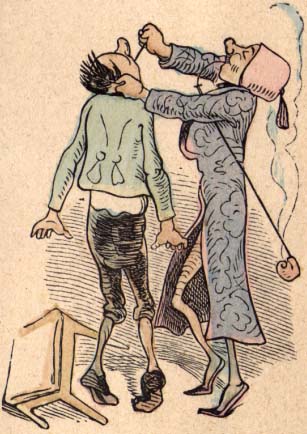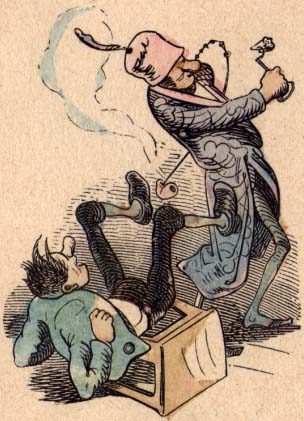 The only thing I remember from reading Pincher Martin is that after death by drowning, one may find oneself marooned in the middle of the ocean on a small rocky crag. The crag is scaled up from Martin's own rotten tooth, and embodies the petty, self-centred concerns that Martin clings to instead of moving on. The moral is, do not let a dentist remove that rotten tooth -- you may need it as a refuge some time in a self-imposed purgatory. Holes are good.
The only thing I remember from reading Pincher Martin is that after death by drowning, one may find oneself marooned in the middle of the ocean on a small rocky crag. The crag is scaled up from Martin's own rotten tooth, and embodies the petty, self-centred concerns that Martin clings to instead of moving on. The moral is, do not let a dentist remove that rotten tooth -- you may need it as a refuge some time in a self-imposed purgatory. Holes are good.Which brings us to David Kunzle's essay The Art of Pulling Teeth in the 17th and 19th Centuries: From public martyrdom to Private nightmare and Political Struggle (not available on the Interlattice so buy your own copy, looters), in which he looks at dentists, and their reputation for retaining their customers' teeth.*


According to Kunzle, Wilhelm Busch's 1865 cartoon strip The Rotten Tooth reflects the tensions that were gripping society at the time as Germany belatedly shifted to an industrial economy. The figure of the dentist, who effortlessly relieves the peasant of his property and then charges him for it, is a focus for widespread feelings of dispossession, disempowerment, and fear of change.
But the question remains, what were the dentists doing with all those teeth? It must have been a drag if you were related to a dentist... every birthday and Christmas, you'd know that your present would be another home-made candle-stick, made from plaster-of-paris wrapped around an empty bottle, with teeth pressed in.
Not everyone could be bothered with suspending a miniature paving-machine from under a balloon and programming all the time-switches so that it would arrange teeth into a mosaic.
 Apparently teeth can be used as improvised bullets in guns assembled from chicken bones, which must have come in useful when the peasantry, dispossessed and disempowered by economic forces, resentful of change, went looking for scapegoats and besieged the nearest dental clinic.
Apparently teeth can be used as improvised bullets in guns assembled from chicken bones, which must have come in useful when the peasantry, dispossessed and disempowered by economic forces, resentful of change, went looking for scapegoats and besieged the nearest dental clinic.Other body parts are not so effective. I know that people talk about "being within earshot" of someone, but it turns out not to work.
Meanwhile, negotiations are continuing between Scotland, Ireland, Iceland and Denmark, to settle their rival ownership claims over Pincher Martin's tooth.
---------------------------------------------------------
* Kunzle studies 16th- and 17th-century Flemish art, and the history of comic strips; I want to have his job when I grow up.

7 comments:
Claim; has there ever been a word made more absurd?
ramari, shoved down calamari at an alarming rate.
It's hard to understand why one might reject lead, antimony, steel, tungsten or copper, but if you choose to do so, it's pretty hard to see why one might reject the available options.
If, however, you do, let me suggest to you that in the old days we used to use heavy grey bars of laundry soap and cast it in .22 brass to use in slugs for varmint rounds like .22-250, .250-3000 and .222 Swift.
You can't imagine how thoroughly a rat or bunny disappears when hit with a bullet of soap traveling at close to 4000 feet per second...
Antimony payments are so unkohl.
It's stibnite and I'm alone again.
The novel is often considered one of Golding's most survivalistic works...
It's in the wikipedia, so it must be a word.
~
Why, and I ask this knowing that hitherto unknown regions of drug addiction or Catholic ritual may be opened to me, is the dentist swinging a smoking pink snail around onna string?
Early nitrous-oxide dispenser. Dental technology had not reached the stage of the mask worn by Steve Martin in "Little Shop of Horrors".
So the pink thing is full of nitrous oxide to be wafted around in the hope that some will go where it's needed?
What would Tony Ryall (NZ Minister for Not-as-sick-as-if-you-stayed- home,no really) say?
Post a Comment